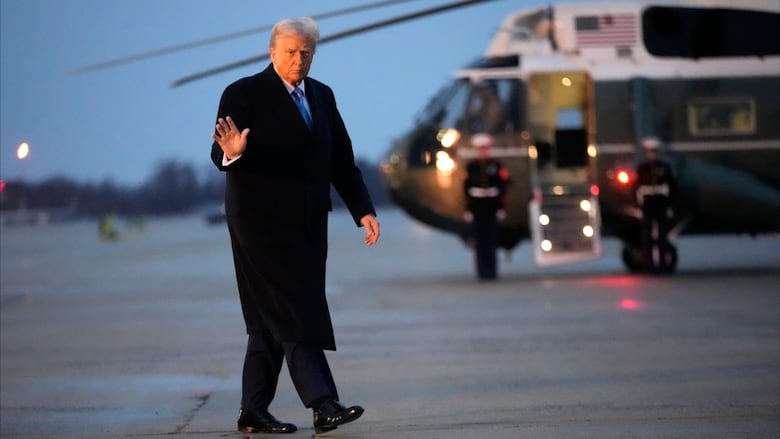Trump's Trade War With Europe: Understanding The Reasons Behind His Outburst

Table of Contents
Trump's "America First" Ideology and Protectionism
The core tenet of Trump's "America First" policy was a staunch commitment to protecting American industries from what he perceived as unfair foreign competition. This protectionist ideology directly fueled the trade war with Europe. The goal was to revitalize American manufacturing and reduce the US trade deficit, a key element of his economic platform. This translated into concrete actions, such as imposing tariffs on European goods.
- Focus on reducing the trade deficit with Europe: Trump consistently criticized the trade imbalance with Europe, viewing it as evidence of unfair trade practices.
- Protecting American jobs from foreign competition: Industries like steel and aluminum were particularly targeted, with tariffs aimed at protecting American jobs from what Trump considered to be unfairly priced European imports. The argument was that these imports were undercutting domestic producers.
- Strengthening domestic manufacturing: The administration aimed to bolster domestic manufacturing through tariffs and other protectionist measures, hoping to reshore jobs and production.
- Re-negotiating unfavorable trade deals perceived as unfair to the US: Trump believed that existing trade agreements with Europe were disadvantageous to the US and sought to renegotiate them, or withdraw from them altogether, to achieve more favorable terms for American businesses.
This "America First" approach led to direct confrontations with European partners, escalating tensions and triggering retaliatory measures from the EU. The steel and aluminum tariffs, for example, sparked immediate responses from Europe, initiating a tit-for-tat exchange of tariffs on various goods.
Allegations of Unfair Trade Practices by the EU
Trump's administration repeatedly accused the European Union of engaging in unfair trade practices, justifying the imposition of tariffs as a response to these alleged actions. These accusations often lacked the nuance of the underlying complexities of the EU's internal market.
- Subsidies to European industries (e.g., Airbus): A major point of contention was the alleged subsidization of Airbus by European governments, which Trump argued gave the European aircraft manufacturer an unfair advantage over its American competitor, Boeing. This led to retaliatory tariffs imposed by both sides.
- Tariffs and non-tariff barriers imposed by the EU on US goods: The Trump administration pointed to various tariffs and non-tariff barriers imposed by the EU on American goods, claiming these hindered US exports to Europe.
- Disputes over agricultural products and intellectual property: Disagreements over agricultural subsidies and intellectual property rights further fueled the trade tensions, adding complexity to the already strained relationship.
While some of Trump's claims about unfair trade practices held merit, others were met with skepticism and criticism. The validity of his arguments became a subject of debate, involving investigations and rulings by international trade organizations.
Political Leverage and Domestic Politics
The trade war with Europe arguably served Trump's domestic political agenda in several ways. His tough stance on trade resonated with his base, who viewed it as a sign of strength and a rejection of globalist policies.
- Appealing to his base by projecting strength and taking a tough stance on trade: The trade war became a symbol of Trump's "America First" approach, appealing to voters who favored protectionist policies.
- Diverting attention from other domestic issues: Critics suggested the trade war was used to deflect attention from other controversial domestic issues.
- Boosting his image as a strong negotiator: Trump presented himself as a skilled negotiator, willing to challenge established trade norms to achieve better deals for the United States.
The economic impact of the trade war on the American economy was complex and debated, with some sectors benefiting while others suffered. Its effect on Trump's approval ratings was similarly complex and varied depending on the specific segment of the population.
The Impact of the Trade War on Both Sides of the Atlantic
The trade war had significant economic consequences for both the US and the EU. The resulting uncertainty impacted businesses and consumers alike.
- Increased prices for consumers: Tariffs led to increased prices for consumers on a variety of goods, impacting household budgets in both regions.
- Uncertainty for businesses and investors: The tit-for-tat tariffs created uncertainty for businesses and investors, hindering investment and economic growth.
- Disruption to supply chains: The trade war disrupted established supply chains, forcing businesses to find alternative sources of goods and materials.
- Retaliatory tariffs impacting specific industries in both regions: Specific industries in both the US and the EU were disproportionately affected by retaliatory tariffs, leading to job losses and economic hardship in some sectors.
The long-term effects of the trade war remain to be fully assessed. However, it undoubtedly damaged transatlantic relations and created uncertainty in the global trade system. The potential for future trade relations between the US and EU hinges on addressing the underlying issues and rebuilding trust.
Conclusion
Trump's trade war with Europe was driven by a complex interplay of factors, including his "America First" ideology, accusations of unfair trade practices by the EU, and domestic political considerations. This conflict resulted in significant economic consequences for both the US and the EU, impacting consumers, businesses, and international relations. Understanding the complexities of Trump's Trade War with Europe is vital for navigating future global trade relations. Further research into the specific impacts on individual industries and ongoing trade negotiations is encouraged to fully grasp the lasting consequences of this significant period in international economics. Continue your learning on the intricacies of Trump's Trade War with Europe and its global ramifications.

Featured Posts
-
 Van Der Poel Third At Paris Roubaix Pogacar A Minute Behind
May 26, 2025
Van Der Poel Third At Paris Roubaix Pogacar A Minute Behind
May 26, 2025 -
 F1 News Mercedes Investigates Following Lewis Hamilton Update
May 26, 2025
F1 News Mercedes Investigates Following Lewis Hamilton Update
May 26, 2025 -
 10 Best Tv And Streaming Tips To Start Your Week
May 26, 2025
10 Best Tv And Streaming Tips To Start Your Week
May 26, 2025 -
 Moto Gp Inggris Jadwal Balapan Lokasi Dan Informasi Tiket
May 26, 2025
Moto Gp Inggris Jadwal Balapan Lokasi Dan Informasi Tiket
May 26, 2025 -
 Nike Running Shoe Guide 2025 Matching Shoes To Your Running Style
May 26, 2025
Nike Running Shoe Guide 2025 Matching Shoes To Your Running Style
May 26, 2025
